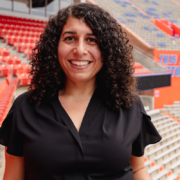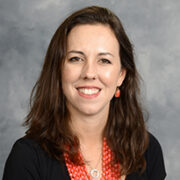Research Spotlight: Elizabeth Washington
Q & A with Elizabeth Washington, Ph. D., Professor in the School of Teaching and Learning
What research are you currently working on?
The overarching theme of my research lies at the intersection of democratic citizenship education, controversial issues teaching, the teaching of difficult/traumatic history, and social justice teaching in a democratic society, mainly for grades 6-12 social studies curriculum and teaching. This is also where my research, curriculum development, and teaching coalesce.
Drawing from a rich body of research that includes the work of Diana Hess, Paula McAvoy, Wayne Journell, Li-ching Ho, Steven Camicia, Judy Pace, and others, I am driven by such questions as What do “traumatic” and “difficult” history mean? How can preservice teachers best be prepared to teach difficult history and controversial issues? How do we make sense of what issues/topics should be treated as controversial in the classroom? What can we learn from content analysis of specific curriculum materials for teaching controversy–especially in terms of the range of perspectives they provide? What controversial topics might help students gain the skills and attitudes necessary to tackle even tougher topics? What is the nature of the arguments about these topics/issues in the larger society? How might we facilitate more inclusive discussions of controversial issues? What factors complicate teachers’ efforts to conduct inclusive discussions? What identity risks and attacks are likely to come up as students consider certain topics, and how do we help students deal with possible risks? What are some issues related to teacher political disclosure that help us sort through the larger issues of how disclosure can be done responsibly, professionally, and ethically? What can we learn from international and cross-cultural settings about teachers’ decision-making regarding their rationales, chosen topics, instructional practices, and perceived obstacles and pathways to teaching about issues that carry implications for democracy and social justice?
What is the broader impact of your research?
I focus on the autonomous, important decisions that teachers make every day about what to teach and how to teach it. Nowhere is this more evident than in decision-making about teaching difficult/traumatic history and controversial issues. In my research, I have found that the most difficult issues are those that should no longer seem especially controversial but are manufactured as such by external actors such as politicians and media pundits. A few things are abundantly clear: (1) there is no agreed-upon definition of what is “controversial”; (2) context can make all the difference in the definition; (3) almost any issue can become “controversial” in a specific set of circumstances. In my work, I am always asking: What are the implications of teaching about controversial issues for democratic citizenship education? What habits of mind and skills do we want to cultivate in our students so that they can be civically engaged in effective ways?
My research has been impactful for teachers and students because of the research-based curriculum projects I have designed for teachers in Florida. I wrote the 7th-grade civics curriculum that has been used statewide for the past ten years, the African American history curriculum that high school teachers have been using in Alachua County and several other school districts in Florida, and a high school media literacy curriculum used at P.K Yonge. I have also collaborated with a P.K. Yonge teacher on incorporating civics and social justice issues into a middle school world history curriculum. These projects have led to articles in national publications and presentations at the National Council for the Social Studies and other organizations in which I am active.
I have also been a guest lecturer for the Florida Free Speech Forum, where I talked about teaching controversial issues. I have done a webinar for the National Council for the Social Studies and have co-authored an article for the Brooking Institute on teaching controversial issues. The Brookings article led to my invitation to be a guest on a national podcast, Democracy Nerd. At the international level, I am currently a Fulbright Distinguished Scholar at Masaryk University in Brno, Czech Republic, where I am exploring the beliefs and experiences of pre-service teachers with civic education in their 6-12 schooling.
What other research topics are you interested in?
I am interested in teacher beliefs and decision-making regarding how to teach civics and history (especially the history of racial violence in the U.S.) in the current Florida political environment, the teaching of social issues, and the incorporation of mindfulness into teaching about systemic racism.







